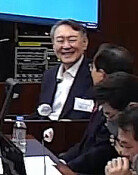Japanese Foreign Ministrys Response
Japanese Foreign Ministrys Response
Posted March. 18, 2005 22:36,
The Japanese Foreign Ministers statement on Koreas compensation demand on March 17 is viewed in general as a repetition of its traditional assertion. The announcement has made it clear that Japans response to Koreas protest over the historical controversies is half-hearted at best. Therefore, it would not be easy to find a solution to the current strained and confrontational relations between the two countries.
A Statement for Domestic Use?
The general tone of the Japanese governments statement can be summed up as the following, We have nothing to change. Do not expect any shift in policies. The statement can be a kind of expression of no comment.
After his cabinet meeting, Chief Cabinet Secretary Hiroyuki Hosoda held a press conference on the morning of March 18 and declared, The statement by our Foreign Minister was a response to Koreas statement delivered yesterday evening. It came after the Japanese authorities pulled their thoughts together, without further explanation on the matter.
A diplomatic source concluded the statement is for its own use, saying, Its just that the Japanese government told its people that it will not make concessions on territorial disputes. There is nothing more to it.
In the afternoon of March 18, the Japanese Foreign Ministry met with Korean correspondents to spell out the background of its statement. They added that the response made on the same day as Koreas official statement indicates Japans seriousness in handling the issue.
The ministry, in the morning cabinet meeting, reportedly asked officials to deal with the matter more future-orientedly and in line with the statement. It appears to mean that officials should refrain from provocative remarks on Dokdo or the Japans history textbook.
No Substance Whatsoever to the Statement
Approximately the first half of the statement was dedicated to stressing the improved points in Korean-Japanese relations and the importance of bilateral cooperation and a friendly relationship in handling the North Korean nuclear standoff. To put it strongly, the announcement was more like an attempt not to face reality than an explanation of the real situation.
In the second half, issues are mentioned including an apology for the past wrongdoings of Japan, Koreas property claims against Japan, examination and return of remains, Dokdo and the distorted history textbook. However, it was a mere reiteration of facts with no development.
Regarding the Dokdo issue, two sides differ in their opinions. Korea sees the annexation of Dokdo in 1905 as the start of Japanese colonization. On the other hand, Japan justifies its Dokdo annexation by using the phrase due to the old attitude difference between the two nations.
Moreover, regarding the controversy over the nations history, the foreign authorities borrowed a line from former Prime Minister Tomiichi Murayamas statement in August 15, 1995. The line begins, The historical fact that Japan inflicted losses and suffering on people in several Asian countries...
Concerning the compensation issue, too, Japan insisted on its traditional stance that the Korean-Japanese Treaty concluded this issue, thereby completely ignoring Koreas suggestion of re-discussing comfort women (sex slavery), and nuclear victims.
The ministry also failed to mention the so-called deference to neighboring countries provision in its statement concerning the review of the history textbooks. The provision provides for the deference to the Asian countries that were invaded by Japan during the Second World War.
Hun-Joo Cho hanscho@donga.com




![지하철 타고 가는 북한산성…외국인도 반한 ‘K등산 맛집’[전승훈 기자의 아트로드]](https://dimg.donga.com/c/138/175/90/1/wps/NEWS/IMAGE/2026/01/10/133120824.1.jpg)

![두쫀쿠가 뭐라고…영하 8도에 아이들 1시간 줄세운 어린이집 [e글e글]](https://dimg.donga.com/c/138/175/90/1/wps/NEWS/IMAGE/2026/01/09/133126969.3.jpg)
